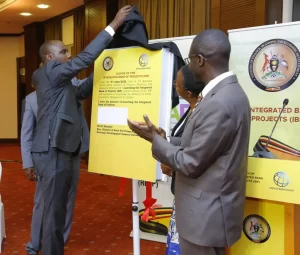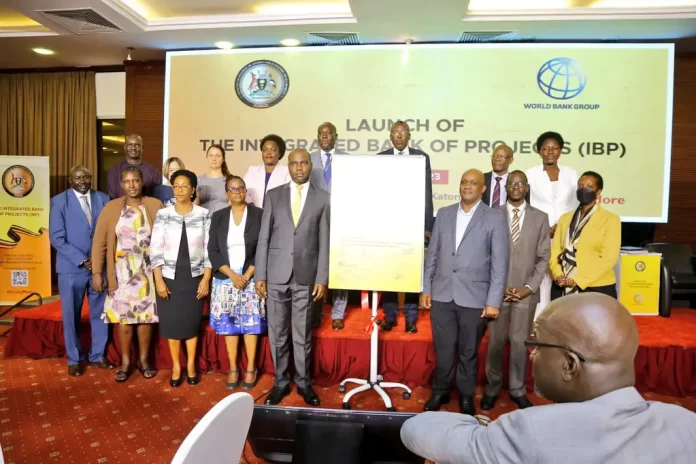Hon. Henry Musasizi, Minister of State for Finance, Planning, and Economic Development (General Duties), today, June 5, 2023, launched the Integrated Bank of Projects (IBP) system at Serena Conference Center, Kampala.
The Minister said that the system covers all phases of the Public Investment Management System cycle and has enhanced access to information on projects for all stakeholders, including ministries, departments, and agencies (MDAs), development partners, and Development Committee members.
He acknowledged that before the introduction of IBP, only 10% of the projects were used to complete the appraisal process. However, with the rollout of the system, the number has substantially increased to 37% of all uploaded projects.

The system has provided a faster and more effective project preparation and appraisal platform because all processes, templates, and workflows are streamlined on the system.
“This system has not only supported my ministry in reducing the time taken to prepare and appraise projects, but also enabled the sequencing and scheduling of project interventions in line with the strategic objectives of the government in the medium to long term. This will enhance value for money for public projects by increasing the number of projects that finish on time and within budget. It will also increase accountability for public resources and further improve access to services,” said Minister Musasizi.
He added that the public investment management system has previously suffered numerous challenges, including limited tracking of projects by both technocrats and politicians, which has often hindered effective monitoring of project performance, oversight during execution, and consequently failure to attain project outcomes.
According to the Minister, the system has been developed as a result of the diagnostic study that was conducted by the Ministry in collaboration with the World Bank, in 2016 on strengthening public investment management in Uganda.
Following the study, the government formulated and adopted a comprehensive multi-year action plan for public investment management, which has been implemented to strengthen the preparation, selection, implementation, and monitoring of projects.
In his presentation, Dr. Mikhail Miklyaev, one of the developers, said that the IBP Phase II system consists of the following reports: the Public Investment Plan report, the Prioritization report, and the Procurement Plan report, among others, that will assist in ensuring efficiency and accountability.
Hon. Musasizi said that the government has continued to make efforts to ensure efficient and effective public investment management, which necessitated putting in place different initiatives, including restructuring the Ministry of Finance, to create a Department dedicated to coordinating public investment management, which would, among other things, be responsible for developing and adopting a system for tracking all public investments throughout the country.
The minister thanked the team under the technical leadership of the Permanent Secretary/Secretary to Treasury for taking action to have a functional system covering all phases of the Public Investment Management System cycle.
Hon. Musasizi implored his colleagues, fellow politicians to embrace the system so as to enhance their oversight role in public investment management by ensuring efficiency through improved transparency in project preparation, selection, and implementation, as well as timely review of public investments by the Development Committee.
He encouraged the government ministries, departments, and agencies (MDAs), development partners, and the people of Uganda to appreciate and support this digital transformation agenda in public investment management.
Mr. Ashaba Hannington, Commissioner of the Project Analysis and Public Investments Department, called for continuous capacity building in integrated project appraisal and project management across government.
In his closing remarks, Hon. Musasizi thanked the World Bank for its continued support of Uganda’s development agenda and, in particular, the Public Finance Management Reforms, which have ensured efficient allocation of resources, value for money, transparency, accountability, and strengthened the fight against corruption in the use of public resources.















